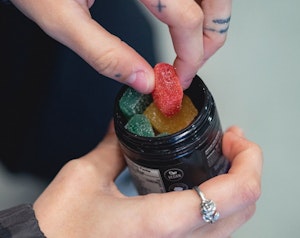
Herb
THC Vape 101: What They Are, How They Work & What to Watch Out For
Understand what THC vapes are, what's inside, and whether or not they're worth your purchase.
THC vapes are one of the most popular ways to consume cannabis in 2025, but not everyone understands what’s actually inside these devices, how they work, or the potential risks they carry. Whether you’re new to cannabis vaporizers or just curious about the different types of THC vapes sold today, it’s important to know what you’re inhaling and how to use these products responsibly.
Let’s break down the basics, from THC vape ingredients to how THC vape pens work, plus common questions about safety, legality, and effects.
What is a THC Vape and THC Cart?

Herb
So, what is a THC vape? In cannabis, the term “THC vape” usually refers to a complete vaping setup. This device heats cannabis flower or concentrated cannabis oil into vapor, allowing you to inhale THC without combustion. These devices range from disposable pens and rechargeable batteries with cartridges to dab pens and dry herb vaporizers. The unifying factor is the vaporization process, which uses heat to activate THC without burning plant material.
A THC vape cart, or cartridge, is just one part of this system. Carts are small, pre-filled containers of liquid cannabis oil (usually distillate, live resin, or liquid diamonds) that attach to a vape battery. The cart contains the oil, while the battery provides power to the heating element that turns it into vapor.
Types of THC Vape Pens and How They Work

Herb
There are several different types of THC vape pens, each with its own features and method of operation. Here’s what you need to know about how THC vapes work, depending on the device.
Disposable THC Vapes

Herb
Disposable THC vapes are the easiest to use: no buttons, no charging, no cartridge swapping. You inhale, and the attached battery activates the heating element, vaporizing the cannabis oil instantly. Once the oil is gone, you toss the device.
Most disposables contain distillate or live resin, sometimes mixed with added terpenes for flavor. While convenient, they aren’t the most eco-friendly option, and the potency can vary between brands.
Vape Cartridges (510 Thread)

Herb
The 510-thread vape pen is the gold standard for THC vape carts. You screw a cartridge onto the battery, press a button (or inhale, depending on the model), and the device heats the oil through a coil or ceramic heating element.
Reusable pens give you more flexibility. You can try different vape cartridges, control the temperature, and recharge the battery as needed. For many cannabis consumers, this is the most cost-effective and customizable way to vape.
If discretion is the priority, a low-profile battery can matter just as much as the cart itself. The Myster MagBox is designed to pass as an everyday tech accessory, looking more like a phone power bank than a vape. Even better… it’s magnetic. The MagSafe-style backing lets you attach it directly to the back of a smartphone, so it rides along naturally with something you already carry.
Despite its stealthy form, it works with standard 510-thread cartridges (including larger sizes up to 2g). A retractable mouthpiece keeps the device discreet when not in use, and preset voltage makes every hit a breeze. With a rechargeable battery via USB-C and a six-month warranty, it’s built for convenience as much as concealment.
For anyone who wants their setup to blend seamlessly into daily life—subtle, modern, and easy to carry—this kind of phone-style 510 battery is by far the most practical alternative to more obvious vapes.
Dab Pens

Dip Devices
If you prefer stronger hits, dab pens are designed for waxes, live resin, and liquid diamonds. Compared to vape pens, these devices don’t use cartridges; you load the concentrated cannabis oil directly into the chamber.
A dab pen works by heating the concentrate on a coil or ceramic plate until it turns into vapor. The result is usually a potent experience, making dab pens well-suited for chronic pain, deep relaxation, or unwinding after a long day.
Dry Herb Vapes

Big Bear
Although most people think of THC vapes as oil-based, dry herb vaporizers are technically THC vapes too. Instead of oil, you load ground weed into the chamber. The device heats the flower at lower temperatures, releasing THC vapor without burning the plant.
Many consumers choose dry herb vapes for the flavor profile and smoother inhale. It’s also a solid option for those who want to avoid additives or thinning agents found in some vape cartridges.
THC Vape Ingredients Explained

Herb
When you pick up a THC vape, you’re inhaling more than just THC. The ingredients in THC vape pens vary depending on the product, and knowing what’s inside can help you make a safer and more informed choice. It’s not only about the THC concentration, the type of concentrate, how it’s processed, and what’s added after extraction all shape the final experience.
From Rosin to Distillate: Concentrates Found in THC Vape Carts
Vape carts today use a range of concentrated cannabis oils, and each type delivers different potency, effects, and flavor profiles.
- Distillate: Highly refined THC oil, usually testing over 90% THC. It’s stripped of almost everything except THC, then re-flavored with terpenes to create specific strain profiles.
- Live Resin: Made from fresh-frozen cannabis, keeping more of the plant’s aromatic compounds. It offers a fuller-spectrum experience with bold flavors and an array of cannabinoids.
- Live Rosin: A solventless concentrate, extracted using only heat and pressure. It preserves the plant’s original terpene content and is considered one of the highest-quality options for vape cartridges.
- Diamonds and Sauce: This refers to THCA crystals (the diamonds) combined with a terpene-rich sauce. The sauce provides flavor, while the diamonds deliver a strong THC hit once vaporized and decarbed.
- Liquid Diamonds: Despite the name, this typically isn’t diamonds and sauce. Liquid diamonds are often a fancy way of describing distillate blended with added terpenes to create a smoother, more flavorful vape. It’s marketed for its potency, but chemically it’s closer to distillate than actual THCA diamonds.
- Isolate: Pure THC with no terpenes or other cannabinoids. It’s odorless, flavorless, and delivers THC only, so no entourage effect.
- Hemp-Derived THC (Delta-8/9): Made from hemp using a chemical process that converts CBD into Delta-8 THC or Delta-9 THC. These are sometimes legal federally but face strict regulations in some states.
Other Ingredients in THC Vapes
Besides the concentrate, some THC vapes may contain:
- Botanical or cannabis-derived terpenes for flavor and effect, or to mimic specific strains
- Thinning agents like PG, VG, or MCT oil
- Vitamin E acetate, which is linked to serious public health risks and should be avoided
- Additional flavorings
Look for products that have undergone rigorous testing to ensure you’re not inhaling pesticides, chemicals, or unsafe additives.
What to Watch Out For: THC Vape Risks

Giorgio Trovato / Unsplash
THC vapes are often marketed as a safer alternative to smoking, but that doesn’t mean they’re entirely risk-free. Vaping typically produces less lung stress than inhaling burnt plant material, but research on the long-term health impacts is still in progress, especially regarding frequent or heavy use.
Some studies suggest that cannabis vaporizers may reduce exposure to harmful byproducts found in smoke. However, problems still arise, particularly when unregulated products are involved. In 2019, the CDC investigated a nationwide outbreak of lung injuries, tracing many of the cases back to illegal THC vape pens containing vitamin E acetate. This cutting agent should never be inhaled.
Potential Health Risks of THC Vapes
- Lung irritation from unsafe additives or poor-quality oils
- Overconsumption, since high-potency concentrates are easy to overdo
- Contamination, especially in products bought outside of licensed dispensaries
- Unknown long-term effects, since there isn’t enough data yet on years of regular vaping
If you choose to use THC vapes, stick to third-party lab-tested products from regulated sources and brands with quality assurance. This helps reduce your exposure to harmful chemicals and ensures the cannabis oil you’re inhaling meets safety standards.
Herb’s Recommendation: VSPR Strawnana Distillate Cartridge
Available at Temescal Wellness, the VSPR Strawnana Distillate Cartridge delivers that perfect strawberry-banana smoothie profile, sweet but clean, with a mellow hybrid high that eases you into bliss.
Clocking in at 91.09% TAC and 88.1% THC, this cart isn’t for the faint of heart. Seasoned users will definitely appreciate it for nighttime decompression or melting away post-work stress.
At $25 for one full gram, it’s also one of the best value carts on the shelf right now. If you usually hate harsh or botanical-tasting vapes, this is fun, fruity, and super smooth. Order now for pickup from Temescal Wellness.
Frequently Asked Questions

Herb
What is considered a high THC vape?
A high THC vape usually contains over 75% THC concentration. These products are often made with liquid diamonds, distillate, or live resin for more potent effects. High-potency vapes deliver fast, intense highs and are best suited for experienced consumers or those treating specific conditions like chronic pain.
How long does a THC vape high last?
How long a THC vape high lasts depends on several factors, including how much you consume and your personal tolerance. For most people, the high lasts between 1 and 3 hours, with peak effects occurring within the first 30 to 60 minutes. Since vapes hit quickly, the onset is faster than edibles, but the duration is usually shorter.
Do THC vapes smell less than smoking?
Yes, but do THC vapes smell at all? They do, but the smell is lighter, less pungent, and fades faster compared to smoking cannabis. Some vapes produce a sweet or herbal scent depending on the terpenes present, but the odor won’t stick to clothes or furniture like weed smoke does.
How much THC is in one vape puff?
Most vape puffs deliver between 1-5 milligrams of THC, depending on the cannabis oil potency and your device settings. Smaller puffs at lower voltages produce less THC vapor, while longer draws at higher temperatures will give you more per hit. Since it’s easy to overdo it with high-potency oils, starting with a low dose is usually the safer approach.
Are THC vape pens bad for your lungs?
While vaping THC may reduce some of the harm associated with smoking, inhaling chemicals or poorly made products can still cause lung irritation. Stick to tested products with clear ingredient lists to reduce the risk of respiratory issues.
Are THC vapes legal?
Are THC vapes legal? In California and other cannabis-legal states, licensed dispensaries sell regulated marijuana products like THC vape pens and cartridges legally. In states where cannabis isn’t entirely legal, hemp-derived THC vapes like Delta-8 might be available, but laws vary, and the legal landscape continues to shift.
Do THC vapes expire?
Yes, THC vapes do expire, usually within 6 to 12 months after purchase. Over time, cannabis oil can lose potency and the flavor profile, as well as the metals within the cartridge, degrade. For the best experience, store your vape cartridges upright in a cool, dark place away from direct light or heat.
Herb Recommended Products:
READ MORE












